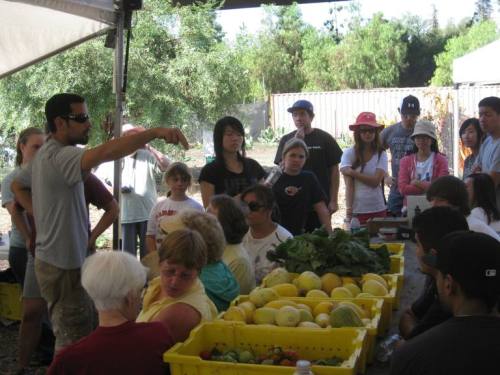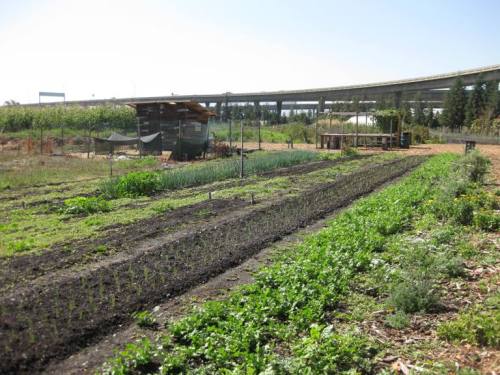
Mark Medeiros, Farm Manager at Veggielution Farm, tells volunteers to take home whatever they need from the remaining harvest of the workday.
Agriculture is the backbone of a people. A people’s ability to do work and live as a healthy society rests upon its ability to feed itself sustainably. Agriculture is also the most widespread direct interface a people will make with the land. The way people grow food reveals their ability to care for the environment.
In the United States, the American people’s relationship to agriculture has changed dramatically over history. The family farm was the means by which the majority of Americans made their livelihood sixty years ago. Today only 2.2% of Americans make a living by farming. Most of us have never seen a farm let alone know where the food we pick off the grocery shelf was made and how it was brought to us.
Yet it is in this same moment that people all over the country are coming back to agriculture. Most particularly in urban areas, where we have grown disenfranchised from a healthy relationship with our environment, we are returning to the land as a place of community.
Community gardens have allowed families to grow their own food for many years now. In the last few years many urban farms have sprung up enabling people to find food grown in their own neighborhood. Most importantly the urban farm is becoming a center for community organizing.
This weekend I came to a workday at Veggielution Farm in San Jose. Nearly all of Veggielution’s labor is provided by volunteers, so Saturdays are the most welcome days when upwards of eighty people come together to dig, plant, and harvest. This weekend saw a group of women from the Presbytarian church, local Latino families, and college students joining together to work the land. For many, especially the young people, this is their first time working with their hands, working with soil and plants. This is how community happens.
Without pretentious ambitions, people from every corner of life come together at Veggielution simply to do the work that needs doing. We grow together and share the bounty of the harvest. Something else is happening at the farm too.
We teach cooking classes in Spanish to women in the neighborhood. We give high school youth small plots to jumpstart their own food growing experiences. Families are encouraged to bring their children to Family Days to learn about farming together. The urban farm is not only recapturing the curiosity and drive in people to be connected with nature and to do work with our hands, it has also become a place where people are building community.
What will the urban farm in America become? It certainly is not a short term project — any farmer will tell you that farming is a commitment beyond the seasons. Farming takes a commitment to improve the soil, to better the environment, and improve the lives of members of the community.
In the Bay Area we are lucky to be at an epicenter of the urban farm movement. Places like Veggielution, Urban Tilth in Richmond, City Slicker Farms and Dig Deep Farms in Oakland are bringing community members together to feed themselves.
Cities are transforming policies to encourage food production within their borders. Oakland now hosts a Food Policy Council that develops policy recommendations for the City of Oakland to promote a just and sustainable food system.The Mayor of San Francisco just this year signed a law that would allow urban farmers to grow and sell fruit and vegetables they produce in the city.
There is a national momentum around this new kind of agriculture. In places like Detroit, people are reworking vacant and unused land to grow food and revitalize their community. Groups like the Detroit Food Justice Task Force are helping people connect with each other and develop policies to build a strong food system.
Places like these indicate a shift in the way people are thinking about food and farming. Not only are people beginning to find ways to produce food for themselves, food growing also becomes the means by which community happens. Urban farms become agro-community centers where we connect with each other, learn skills, and grow the rich resources inherent in our neighborhoods.
The strength of a people is grown out of its agri-culture — that is, its culture of food-growing. Urban farms become then a means by which we heal our communities and build self-reliance. They are long-term projects invested in bringing value to the land and connecting people to one another. In this spirit the farm has the potential to be a true center of community.
In this spirit, may many hands come to the earth. Long live the urban farm.


love veggielution! you must take me back there again.